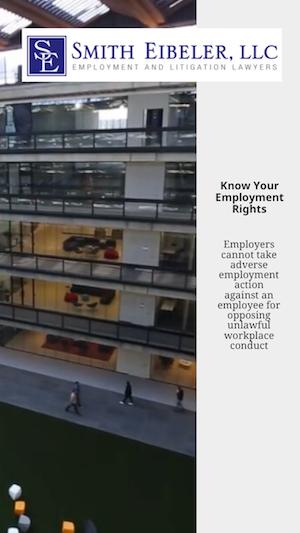OF DISCRIMINATION AND HARASSMENT
Whistleblower Retaliation
When Following the Rules Gets You Fired — Our New Jersey Employment Attorneys Can Help
Workers who complain about unlawful business activities of their employees should never suffer retaliation for having the courage to bring these important issues to their employers attention. New Jersey has enacted laws that are designed to protect individuals who make good faith complaints of unlawful activity of co-workers or their employer. Like most all employment laws, New Jersey’s law that pertain to anti-retaliation can be complex and constantly changing. Our workplace retaliation attorneys are well-versed in state and federal laws that protect whistleblowers from suffering adverse employment action from their employer.
New Jersey maintains a strong public policy to protect whistleblowers from suffering retaliation. New Jersey has enacted numerous laws designed to penalize employers who retaliate against whistleblowing employees. Most notably, the New Jersey Conscientious Employee Protection Act (CEPA) makes it unlawful for an employer to take adverse employment action against an employee who discloses, objects to or refuses to participate in illegal actions of his or her employer. First Enacted in 1986, the New Jersey Conscientious Employee Protection Act is remedial legislation that is entitled to liberal construction, with the stated purposes to protect whistleblowers from retaliation by employers and discouraging employers from engaging in illegal or unethical workplace activities.
The Conscientious Employee Protection Act, protects employees who complain, disclose or refuse to participate in a workplace activity to which he or she reasonably believes to be in violation of law or public policy from suffering an adverse employment action for engaging in the protected activity. New Jersey’s whistle-blower does not require an employee prove that the complained of conduct amounts to an actual violation law, but rather, that the employee had a reasonable belief of a violation of law. While termination of employment is the most obvious cases of unlawful termination, adverse employment action can actions less than termination. Adverse employment action is considered action that would dissuade a reasonable employee from making or supporting a complaint of unlawful employee activity or activity that violates a clear mandate of public policy.
Whistle blowers can be retaliated against in subtle ways; for instance, their supervisors find bogus ways to “write them up” or paper their file so to build a case for demotion or termination. Others times, employees are retaliated against by way of harassment by co-workers or supervisors who are unhappy with the employees whistle-blowing activities. When analyzing a potential claim for whistle-blower retaliation, our employment attorneys will investigate to determine “the real reason” why the employee was fired or subjected to other adverse employment actions. If the protected activity is a motivating factor in the employer taking the adverse employment action, the employee has proven causation under the law.
In many situations, the termination of a whistle-blower will have little to do with their performance, and a lot to do with their complaints or objections to their employer’s unlawful activity. Employer activities that are unlawful, criminal, fraudulent or incompatible with public policy mandate fit under the statute. This includes such things as complaining about a violation of OSHA that has or could cause harm to the public health or safety. Another example is objecting to an employer’s failure to adhere to CDC or state regulations on mandatory workplace COVID measures. Other specific examples of unlawful, fraudulent or criminal business activities that could give rise to a whistleblower claim under New Jersey law include:
- Company fraud and embezzlement
- Tax evasion
- Failure to pay overtime
- Failure to pay timely wages and sales commissions
- Purposeful misclassification of federal contractors
- Orders to veil undocumented workers
- Orders to fake loan or bank documents
- Health insurance and Medicare/Medicaid billing fraud
- Stark Act and Federal Anti-Kickback laws
- Attempt to avoid OSHA obligations
While CEPA is the most comprehensive whistleblower retaliation under New Jersey state law, there are many other laws that anti-relational provisions such as the Law Against Discrimination, Family Medical Leave Act (“FMLA”) and the New Jersey Wage Payment Law. We represent New Jersey workers in bringing retaliation claims under all state anti-retaliation laws.
If your employer terminated, demoted, harassed or otherwise retaliated against you as a result of your objections to illegal conduct, we may be able to pursue a claim for the damages caused, including lost wages for the past and the future. Often times when an employee does the right thing by reporting illegal conduct of their employer, they are subjected to adverse employment action, up to and including, the termination of their employment.
Employees who speak out against unlawful activity should never be fired or penalized for doing the right thing. Luckily in New Jersey, if you complain or object to illegal conduct of your employer, you may be protected from employment retaliation under New Jersey state laws. Our New Jersey retaliation lawyers represent whistleblowers in cases against their employer for wrongful termination. The Smith Eibeler lawyers have successfully represented workers who have been retaliated against or wrongfully terminated after opposing or reporting their company’s illegal actions.
If you believe you or a family member has fall victim to unlawful retaliation, we encourage you to contact our office.To learn more about how we can help you, please contact us to schedule a consultation with one of our experienced employment attorneys.






